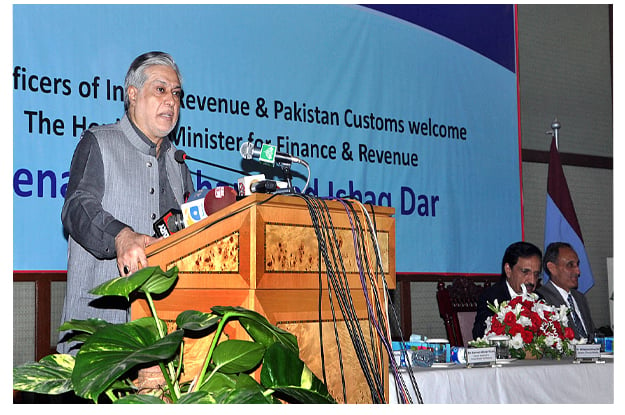
Federal Finance Minister Ishaq Dar on Wednesday justified the new tax measures approved by the government earlier this week, saying they are needed to ensure the provinces get their due share in revenue.
The government approved a Rs40 billion mini-budget on Monday, levying regulatory duties on hundreds of essential items and increasing customs duty on almost all imports by 1%. The move was said to be aimed at meeting a key condition of the $6.2 billion International Monetary Fund bailout programme – the government had missed the revenue target for the next tranche of the loan by Rs40 billion.
Govt greenlights Rs40b mini-budget

But Dar, while talking to tax officers in Lahore on Wednesday, said the measures were aimed at making sure the provinces received their due share from the divisible pool of revenue.
“New taxes have only been imposed on imported luxury items and have nothing to do with locally manufactured products,” the minister insisted. “They will not only help to overcome the budgetary deficit but also provide the much needed finance for the development schemes,” he said.
Dar also claimed that some 5.3 million families will manage to surpass the poverty line in the current year – thanks to the Benazir Income Support Program initiative.
Up in arms: Rasheed leads PTI rally against mini-budget
He said the tax collection target of Rs3104 billion for the current fiscal year is a challenge but we will manage to achieve this figure. He said Pakistan’s total exports currently are 10% of GDP and the figure should be around 15%.
“When we took over the office two years back, the budget deficit was 8.8% which has already been reduced to 5.37%. We are hopeful to further trim this deficit to 4.3% in current fiscal year”, Dar said, adding that to achieve this target we have to meet the Rs3.1 trillion tax collection target.
“When the Pakistan Muslim League-Nawaz started its recent tenure the economic scenario of the country was in dilapidated condition and nearly every international financial institute had closed their programs for Pakistan,” he said. “These financial institutes believed that Pakistan may default by 2014 as its foreign exchange reserves had dropped to an alarming level of $2.75 billion with $5 billion reserves holdings with commercial banks.”
Institutional shortcomings behind mini-budget
“It was not an easy task to re-track the economy but we did it successfully,” the minister added.

“This is the same Pakistan whose growth rate previously was 3%, which now has increased up to 33% due to better tax collections. The annual tax collection growth currently is 16.5% and now various credit rating agencies are declaring Pakistan as the second attractive destination in the world for foreign investments.”
The minister further said that to improve the economic management, PML-N has deducted 30% from non-development budget and eradicated Prime Minister’s Rs42 billion budgets for block allocations.
“We started operation against terrorists in 2014 from our own resources and we didn’t call for any sort of aid from any other country,” Dar said while pointing the previous government’s initiatives to generate funding under the banner of Friends
of Pakistan.
Talking about fresh loans from IMF, Dar said that we are securing new loans in order to repay existing loans. “We have to look for Pakistan’s interest. The current reserves which are $20 billion are likely to reach $21 billion soon.”
Talking about energy, he said that currently electricity shortfall is around 5,000MW. “However, this shortfall will be reduced as we currently are establishing new projects to generate 10,000MW by 2018.”
Published in The Express Tribune, December 3rd, 2015.

1729161093-0/liam-(4)1729161093-0-165x106.webp)


1732603002-0/lamar-(4)1732603002-0-165x106.webp)
1732604291-0/BeFunk_§_]__-(52)1732604291-0.jpg)

1732606500-0/BeFunk_§_]__-(53)1732606500-0.jpg)


1732607286-0/Untitled-design-(2)1732607286-0-270x192.webp)






COMMENTS
Comments are moderated and generally will be posted if they are on-topic and not abusive.
For more information, please see our Comments FAQ